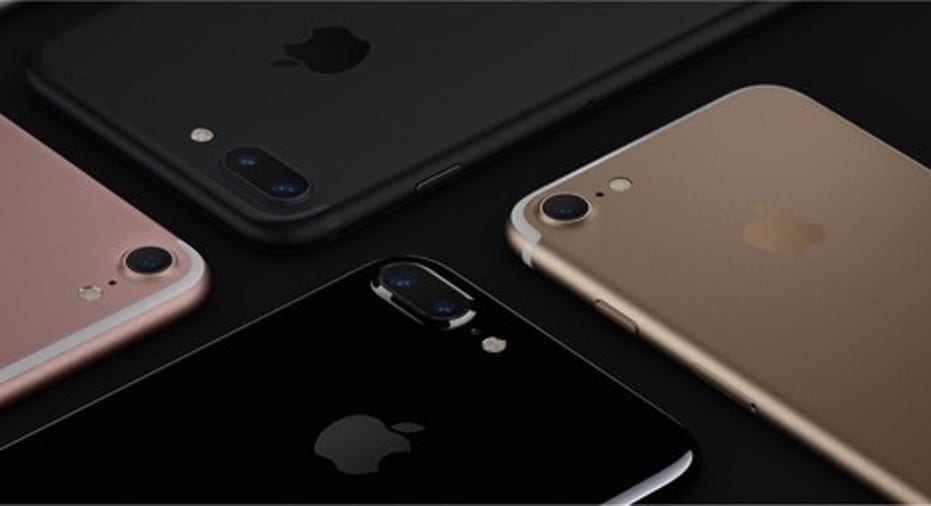Why Isn't Qualcomm's Pain Intel's Gain?

Shares of Qualcomm (NASDAQ: QCOM) recently plunged to a multi-month low after the chipmaker was hit by an FTC antitrust lawsuit in the U.S. and additional lawsuits from its longtime customer Apple (NASDAQ: AAPL). Apple, which exclusively used Qualcomm's baseband modems in its iPhones between 2011 and 2016, claims that Qualcomm withheld $1 billion in rebate payments (compensation for that deal) after it cooperated with Korean FTC regulators, which were probing Qualcomm.
Image source: Qualcomm.
This strained relationship between the two tech giants sounds like great news for Intel (NASDAQ: INTC), which started supplying Apple with modems for the iPhone 7 after its exclusive deal with Qualcomm ended. The reason is simple -- Apple could potentially buy all of its modems from Intel if it severs its relationship with Qualcomm.
But Intel shares barely budged after Apple sued Qualcomm, and only recently rallied following its fourth quarter earnings beat. Let's take a closer look at why investors don't seem convinced that Qualcomm's pain can generate significant gains for Intel.
Understanding Intel's mobile strategy
Intel doesn't report its modem sales separately. They're included in its massive Client Computing Group, which includes PC and mobile chips. The group was created in 2015 to divert attention from the ongoing losses at its mobile division, which previously reported its results separately. Those losses were caused by its generous subsidization of OEMs, with co-marketing agreements, steep discounts, and financial aid for using its mobile Atom chipsets.
By the time Intel killed offmost of its mobile Atom chips last year, the unit had spent billions of dollars to capture just 1% of the market. Intel's fatal mistakes are easy to see in retrospect -- it sold off its ARM-based Xscale unit in 2006 to focus on x86 chips in 2006, then rejected Apple's offer to produce application processors for the first iPhone.
Since much of the Android market uses Qualcomm SoCs, which bundle baseband modems together with ARM-based processors, Intel realized that the Atom couldn't gain much ground in the mobile market. Instead, it had to develop modems for OEMs like Apple, which developed their own ARM-based processors without integrated modems.
Image source: Apple.
Why Intel investors aren't excited
The problem with Intel is that it was likely negotiating terms with Apple from a position of weakness, due to its need to stay relevant in the mobile market. Since Intel has a long record of taking losses to gain market share in the mobile market, it's reasonable to assume that Intel sold its modems to Apple at very favorable prices for the hardwaremaker.
Last year, Cowen & Co. analysts estimated that the deal couldgenerate $1.5 billion in revenues for Intel -- which would only equal 2.5% of its projected revenues this year. Even if Apple dropped Qualcomm and doubled its orders from Intel, that growth wouldn't significantly offset Intel's sluggish growth in PC and data center chips. Moreover, those modems would likely only generate low-margin revenues, which wouldn't significantly boost its bottom line growth.
To make matters worse,Apple throttled the speed ofQualcomm modems in the iPhone 7 to match the slower speed of the Intel modems. This indicates that Apple didn't choose Intel chips because they could match Qualcomm's -- it likely only did so to reduce Qualcomm's negotiating power. This means that other OEMs that use stand-alone Qualcomm modems won't likely switch over to Intel modems anytime soon. This misstep mirrors Intel's failure in mobile application processors -- several OEMs initially gave the Atom a chance, but it was doomed by its inability to match the power efficiency of ARM-based designs.
What Intel investors should expect
Intel investors shouldn't assume that Apple's battle with Qualcomm indicates that the two longtime partners will part ways anytime soon. Apple and Samsung (NASDAQOTH: SSNLF) have been suing each other for years, yet the Korean tech giant is still one of its top suppliers. Therefore, Apple is likely trying to get Qualcomm to lower its chip prices and licensing fees instead of completely parting ways with the chipmaker.
Even if Apple abandoned Qualcomm, investors shouldn't assume that Intel will inherit the entire modem business. Apple often splits component orders from multiple manufacturers, and it has enough resources to develop its own modems -- which would cut both Intel and Qualcomm out of the loop.
10 stocks we like better than Qualcomm When investing geniuses David and Tom Gardner have a stock tip, it can pay to listen. After all, the newsletter they have run for over a decade, Motley Fool Stock Advisor, has tripled the market.*
David and Tom just revealed what they believe are the 10 best stocks for investors to buy right now... and Qualcomm wasn't one of them! That's right -- they think these 10 stocks are even better buys.
Click here to learn about these picks!
*Stock Advisor returns as of January 4, 2017
Leo Sun owns shares of Qualcomm. The Motley Fool owns shares of and recommends Apple and Qualcomm. The Motley Fool has the following options: long January 2018 $90 calls on Apple and short January 2018 $95 calls on Apple. The Motley Fool recommends Intel. The Motley Fool has a disclosure policy.



















